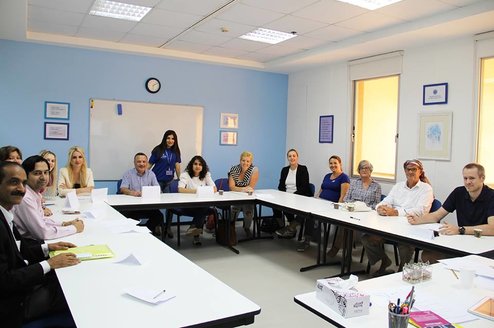Arabic Language Schools in The United Arab Emirates (UAE)
Arabic Language Programs in the UAE
About
A small but mighty and wealthy country in the heart of the Middle East, the United Arab Emirates (UAE) is a popular destination for travelers from around the world. The seven states that comprise the UAE embrace western cultural influences in architecture and lifestyle, while still maintaining a sense of its cultural heritage and religious influences. It's a great spot to experience the Middle East with some comforts of home.
If you're considering learning Arabic, the UAE is also a great candidate. With so many expats in the UAE as well as high quality universities and language institutes, there are lots of opportunities to find a language course that's perfect for you.
Course Types
There are three primary ways to learn Arabic: university courses, language schools, and private tutoring. Each has advantages based on your goals for learning Arabic in the first place.
No matter the reason you're learning Arabic, there are different nuances of the Arabic language by region, so be sure to consult course catalogs to make sure you choose the right dialect you want to learn.
University Courses
Several universities in the UAE offer Arabic language classes as part of their course catalog, and some even focus specifically on helping foreign students integrate with fellow Emirati students through mentorships and group activities. Courses are primarily focused on beginner-level Arabic, though higher level classes may be offered for more advanced students.
Language Schools or Institutes
Most language schools in the UAE are called "Institutes," and a large number of these offer language courses in Arabic. Typically, these classes are part-time or during the evening, and course levels range from beginner to advanced level instruction. Tuition is usually based on a per-class or per-course basis.
Private Tutoring
Tutoring is not as common in the UAE as other countries, though you can find Arabic tutors in the largest cities such as Abu Dhabi and Dubai. These tutors can usually be hired on an hourly basis and many have backgrounds in education. The majority of instructors are male, so while gender may not play a role in your education, be sure to consult with a possible tutor to ensure that your meeting places are appropriate based on the often strict rules of etiquette in the UAE.
Where to Go
Comprised of seven states, the UAE is diverse ranging from extreme wealth in the major cities to poverty in the smaller rural areas. If you don't already speak Arabic, your options for where to study Arabic in the UAE are somewhat limited.
Smaller communities may have language learning options, but won't offer the same support if you can't speak Arabic proficiently in your everyday life. Given this, the best places to learn Arabic in the UAE are the larger cities, such as Dubai and Abu Dhabi.
Dubai
Dubai is the largest city in the UAE and by far the city with the widest variety of language learning options. It has a distinct cultural feel and huge number of extracurricular options where you can practice Arabic outside of class.
Many of the countries top universities and a large number of private language institutes are located in Dubai, so you have plenty of options to choose from.
Read our article about everything you need to know about learning Arabic in Dubai.
Abu Dhabi
The capital of the UAE, Abu Dhabi is somewhat less frequented by travelers and students, but still offers options for learning Arabic while in the country. In Abu Dhabi, you can perhaps find more opportunities for immersion in the Middle Eastern influences of UAE culture, alongside Westernized sights and tourist activities. There are both universities and institutes for Arabic throughout the city.
Planning Your Trip
There are some nuances to life and studying in the UAE, so in addition to this guide, it's worth consulting stories from expats who live in the UAE and reading reviews from past students at any programs you're considering.
Housing
Housing in the UAE largely depends on which Arabic course you enroll in. Most universities offer dormitory or housing support for students, but institutes and private tutors will rely on the student to secure their own housing. In the latter cases, consider a hotel/hostel (for shorter-term stays) or apartment rental so that you have both independence and security in your housing situation.
Visas
Most students -- especially those enrolled full-time -- can apply or be sponsored for a student visa. Costs for this visa range from $200-$800 and the application process can be time consuming, so be sure to apply early.
If you are visiting the UAE and want to learn Arabic during your stay, you'll need a visitor visa for most countries. Each state of the UAE has their own immigration department, so be sure to consult each one separately if you are studying or traveling through more than one.
Costs
The cost to study and live in the UAE is roughly comparable with the US, so it isn't the best destination for a budget language learner. University language courses will likely be higher in cost than institutes or language schools, and tutoring costs range depending on the experience and proficiency of the tutor. Daily costs will be roughly on par with cities like Chicago and Los Angeles, depending on how close you live to city center.
Additional Tips
The UAE may seem quite westernized based on fellow travelers stories and what is portrayed in the mainstream media, but it's worth stating explicitly that the UAE is a Muslim country with stringent social and cultural rules.
Always be aware of the need for modesty, especially for women in both dress and behavior. While you won't likely have a problem in big cities like Dubai and Abu Dhabi, the police force is present and regularly enforces laws even on foreigners.
One last point: the UAE is notorious for patrolling the internet to find people saying negative things about the country, so be aware of what you put on Facebook, as it may cause problems for you later.





